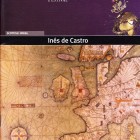Inés de Castro 1996Scottish Opera
Read more about the opera Inés de Castro
For Scottish Opera, the great importance of the 1996-97 season is that it saw the premiere of Inés de Castro. It had been over a decade since the company had last launched a new work - Harper's Hedda Gabler in 1985. The success of the opening at the Edinburgh Festival was deserved, and it was as well received during the main autumn season. That contained six other full-scale productions: Idomeneo, Trovatore, Bohème, Fledermaus, Samson and Delilah and Cunning Little Vixen. The Opera-Go-Round small-scale tour was an enjoyable staging of Così fan tutte. There was a bonus in December, with an enjoyable series of concerts around the country under the title The Scottish Opera Collection.
Inés was the first full-length opera by James MacMillan, and there was a widespread sense of relief that it turned out to be such a success. Scottish Opera had got out of the habit of producing new work, and the few that had appeared failed to set the heather on fire. The only people who disliked it seemed to take that view because some of the subject matter was morbid or repulsive. But that can be used to describe a number of successful twentieth century works, and even Donizetti utilised such themes plenty of times with success. Certainly it applied in spades to the Executioner's Song - though Christopher Purves did mention in an interview many years later that he'd since used it as an audition piece (he got the job).
The performance seemed near ideal - difficult parts for the chorus sounded fascinating, varying in mood from a solemn Stabat Mater at the opening to a couple of near-vaudeville numbers as the people react to the lack of entertainment provided by the executions in the second half. The orchestration was dark and moody, with some intriguingly new sounds welling from the pit. Richard Armstrong had this all under excellent control.
Of the cast, Helen Field made the most of a vocally demanding and dramatically harrowing part. Jeffrey Lawton had only previously sung Tristan with Scottish Opera, though his repertoire in Wales had been far wider. With a steely, dramatic tenor voice, he had no difficulty riding the substantial orchestra. Elizabeth Byrne, as Pedro's wife, had a good stab at depicting a highly-strung figure, not attractive, and with, at least in this production, an evident capacity for self-harming. Stafford Dean made a sympathetic figure of the ineffectual old King. For anyone familiar with the work of ENO, it was particularly good to hear the beautifully noble voice of Anne Collins intoning the lines of the two elderly ladies - the old woman really being a messenger of death, reconciling Inés to her fate. Jacek Strauch, previously seen here in Il trovatore, was an effective villain - and then, of course, there was Christopher Purves.
Jonathan Moore's staging generally made the most of its opportunities. One excrescence was perhaps the intrusion of a modern-day gloss with the chorus as camera-wielding tourists, complete with indiscriminate flash photography. The main plot was given a historical appearance, not the medieval era of the events, but rather a Jacobean style. This seemed entirely appropriate, given the plot's similarities to the popular tragedies of the day by Webster, Middleton and others.
The music came over with an immediate effect. A number of fully three-dimensional characters were created and developed, and the audience is put through the wringer emotionally. Altogether it was a great success. It was revived with equal, if not greater, results in 1999, and filmed by the BBC. The only complaint has to be that this tape has never been issued on DVD, or even on CD. A further revival occurred in 2001 when the production was taken to Portugal.
One small addition to the production cast can be mentioned because of its future importance. The Production Manager is identified in the programme as 'Alex Reedijk of JMS Management'. Under his management Scottish Opera mounted a second production in 2015 - very different from the premiere, but just as successful.
It does seem surpriising that the work has not been taken up by other companies.
Performance Cast
- Inés de Castro
- First Ordinary Person
- Second Ordinary Person
- Third Ordinary Person
- Fourth Ordinary Person
- Nurse
- Pacheco adviser to the King
- King of Portugal
- Pedro Crown Prince of Portugal
- Blanca Pedro's wife
- Old Woman
- Executioner
- Young Girl
- Executioner's Daughter
- First Child of Inés
- Second Child of Inés


